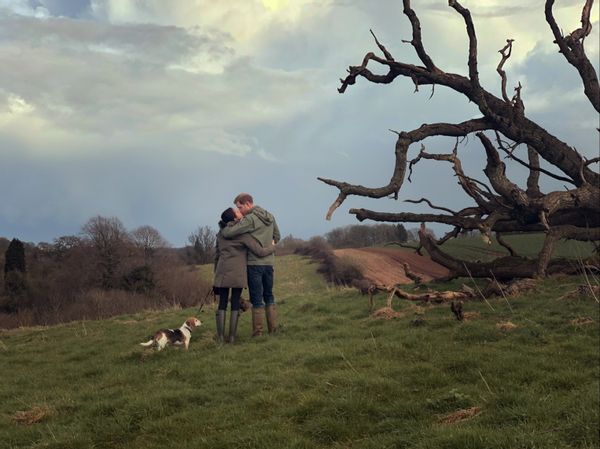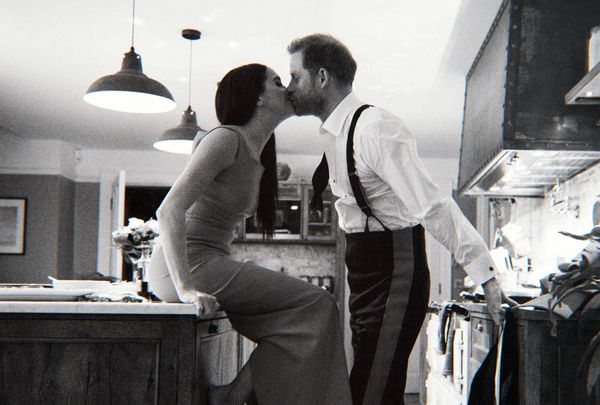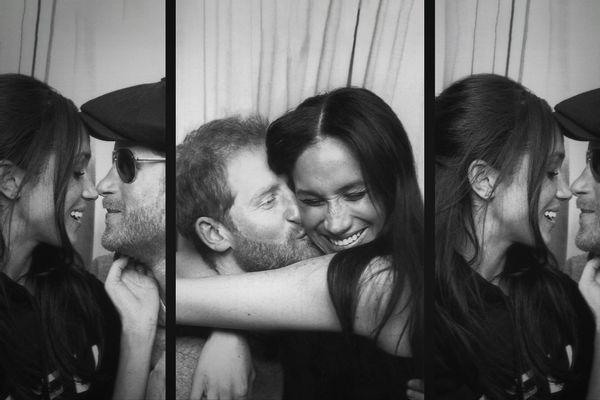
For now, perhaps not forever, the British press can be counted on to describe every move the Duke and Duchess of Sussex make in the context of war, and positioning Meghan Markle as the cause of Prince Harry's departure from royal life.
The opening trio of episodes of "Harry & Meghan" intentionally play that game, only not in the way Buckingham Palace was fearing in the days leading up to its Netflix debut. In the papers, on talk shows and on gossip sites, the speculation was that the series would take aim at King Charles III, Harry's brother William and the rest of the family.
But if the U.S. audience has come to understand and appreciate any single thing about the Sussexes, it is their savvy in the ways of image creation and perception, and how to control a narrative. With the public being primed to expect a hit piece on the royals, Harry and Meghan dodged that by continuing what Meghan has been doing with her "Archetypes" podcast.
Through private pictures, family-provided home video, insights from intimate friends and an extended conversation with her mother, Doria Ragland, the couple's and director Liz Garbus' primary objective was to prove yet again that Meghan and Harry are down-to-earth people devoted to doing great and good things with their singular status.

The second is to condemn the British press, particularly the tabloids, for making Meghan's life hell, along with Harry's and his mother Princess Diana's, long before the American actress entered the picture.
Few machines are more powerful at waging such offensives successfully than Hollywood. Few platforms provide a better launching point for one's salvo than Netflix.
And few targets are more deserving of such a direct hit than Britain's tabloid press, one of the few institutions nearly equal in capability to make or break someone's life.
"Harry & Meghan" didn't begin with the focus people expected and salivated at the thought of consuming, but it is precisely the type of documentary series we should have expected from the couple.
Harry and Meghan already availed themselves of the global media equivalent of a nuke by sitting down with Oprah Winfrey last March. The details overshadowing all else in that meeting of the mononyms was Meghan's reveal that someone in Harry's family expressed concerns that their eldest child Archie might have a dark complexion, and she confessed suicidal ideation.
Once Harry joined the chat he trained the focus on the British media's racist coverage of their relationship, which he considers to be the primary villain in a drama still playing out.
"Truth be told, no matter how hard I tried, no matter how good I was, no matter what I did, they were still going to find a way to destroy me," Meghan
Few targets are more deserving of such a direct hit than Britain's tabloid press.
says as she talks about the weeks leading up to their wedding and the pain she experienced at seeing a half-sister she barely knew trash her in the press, and her father selling staged photos to the tabloids.
Stylewise, the first three hours are a chimera of an advocacy film-meets-Vanity Fair photo spread and true crime series; first, Garbus and her subjects woo the audience by recounting the ordinary sweetness of their love story. Their exchange of first date anecdotes is framed to resemble extended versions of the infamous married couple interviews in "When Harry Met Sally," soundtrack of jazz standards included.
"Dateline" gawkers might recognize this as the setup stretch, demonstrating how well the lives of these two kids were going until the mindless assailants, i.e. the royalist press, enter the picture.
The opening hours and largely respectful to the memories of Queen Elizabeth II and Prince Phillip, while seconding every scathing accusation about the crown's culpability in colonialist racism that Jon Oliver recently enumerated on his show.
If there is a feud between Harry and Meghan and Will and Kate, the Duchess of Sussex feeds that rumor with the smallest crumb in these hours, and mainly to illustrate her awkwardness. Recalling the first time she meets Harry's brother and her eventual sister-in-law for a private dinner, she admits she didn't realize at that time that British people aren't "huggers," and seemed slightly embarrassed to have greeted them in jeans. She politely sums up her impression of Will and Kate by saying, "The formality on the outside carries through on the inside."

Harry, meanwhile, pops on Elton John for his wife as her makeup artist powders her face, swerving through his neck and shoulder to the beat. It's a candid moment Garbus captures that only makes you like the guy more than you may have before – and in case you're wondering whether the couple glosses over that incident from his early 20s when he partied in a Nazi uniform, he and Garbus expose that wart too.
An even more unexpected aspect is how remarkably these episodes supplement the latest season of "The Crown" and the plot concerning Diana's tell-all to biographer Andrew Morton and, later, to Martin Bashir. Harry's adversarial relationship with the press colored his adolescence and early 20s, so one had to suspect something like this was coming.
Less predictable was how thoroughly they'd document their earlier days after announcing they'd step back from performing official duties as senior members, which they did with the encouragement of friends.
The couple's multimillion dollar effort to sell their normality and niceness is bizarre in the larger scheme of things, but understandable.
Those 15 hours of footage provide their version of an unfiltered view of how they were and who they are, which Garbus juxtaposes against archival media clips and officially sanctioned interviews. Scenes that best serve their aim of introducing their authentic selves to the public insert footage of interviews controlled by palace PR with shots of them sitting on their couch more recently, and freely, somewhere in California, and sometime between when filming began in late 2021 and ended in July of this year.
Their stilted engagement question and answer session with a BBC journalist is presented as a prime example, and a loaded one; when the reporter asks if they believe their union will somehow change the monarchy and British, their smiles freeze for a moment, and Meghan looks to Harry to deliver the politic answer.
In that pause, Garbus inserts scenes of Queen Elizabeth II parading through crowds of Black and brown people in commonwealth countries to give weight to the ludicrousness of that question. Powerful as that smash-cut is, it's even more telling to notice the couple's relaxed body language now. Meghan describes the engagement TV appearance as an "orchestrated reality show."
"We weren't allowed to tell our story," she begins explaining, "because they didn't want . . ."
Then Harry jumps in and gently corrects her. "We are not allowed to tell our story. That's the consistency."
"Until now," Meghan finishes, to which Garbus replies, off-camera, "I guess that's why we're here."
Already several U.K. outlets have published their list accusing the Sussexes of making false statements, mainly taking an official palace source's claim that the Windsors were never contacted to respond to the couple's allegations on its face, contrary to a textual statement displayed onscreen as the series begins.
It's easy to picture a plurality of the British public taking that as the truth since, as a recent YouGov poll indicates, Meghan's popularity is the second lowest among all the senior royals; only Jeffrey Epstein's pal Prince Andrew rates less favorably.

Think about that for a millisecond, especially if you're watching "Harry & Meghan" through a non-white lens or an American paradigm. In the United States, the British monarchy is a novelty, one of the last living vestiges of formality and glamourous weirdness. But we love our stars, and Black people and other folks of color are thrilled to be represented in that monarchy by a Black woman. That fact makes this couple's multimillion dollar effort to sell their normalcy and niceness bizarre in the larger scheme of things, but understandable.
We also adore Harry's mother Diana more than Charles and the rest of the brood, especially after she shattered the fairy tale illusion surrounding Buckingham Palace. "Harry & Meghan" isn't grinding that glass quite yet, although the preview trailer from next week drops hints that it's coming. On top of that, January 2023 brings us Harry's provocatively titled memoir "Spare."
Regardless of how one feels about the Sussexes, though, one can't claim they don't know which audience matters more to their professional success independent of the monarchy and, in all likelihood, from Britain. The U.K. remains in the corner of the monarchy; the U.S. overwhelming Team Diana and adores romance and happy endings.
"My mom made most of her decisions from her heart," Harry reminds skeptics, "and I am my mother's son."
The next three episodes of "Harry & Meghan" debut Thursday, Dec.15 on Netflix.







